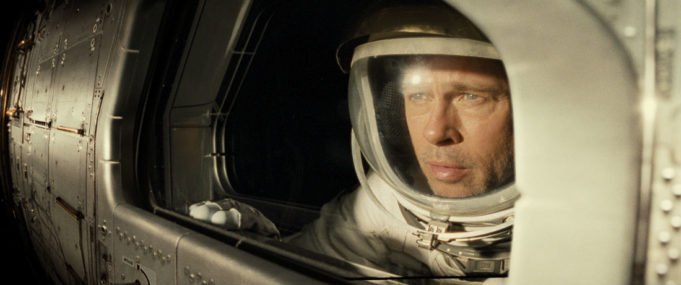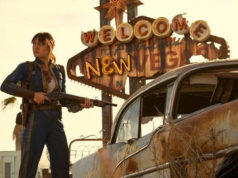I remain stubbornly confounded by the adulation afforded to James Gray. Other intelligent filmgoers — both in my line of work and not — look at his films and see philosophical gravitas, penetrating character study, and rigorous craftsmanship, whereas I only see dull visuals, monotonous somberness, and a general lack of excitement. That’s the case with his crime thriller The Yards, his cop thriller We Own the Night, and his romantic drama Two Lovers, all of them indistinct from the great mass of gritty New York films. His latest film, Ad Astra, is something different, at least. It’s a space opera, and while it isn’t a masterpiece by any stretch, it only occasionally makes me want to slink out of my chair onto the floor. I’d even watch it again — once.
In the near future, Maj. Roy McBride (Brad Pitt) is an astronaut working on a supertall structure meant to broadcast into outer space when a catastrophic power surge hits, causing a series of explosions that he barely survives. Once he comes to, his superiors at the space agency drop a bombshell on him: The surges appear to be coming from Neptune, specifically the manned mission to the outer reaches of the solar system commanded by Roy’s father Cliff (Tommy Lee Jones), which has been incommunicado for some decades amid evidence that Cliff has turned into Captain Ahab out in the black. Roy is sent to the agency’s base on Mars to send a message to his father to request that he help stop the power surges before they exterminate all life on Earth.
This is in the vein of stately science-fiction films whose slow pace mimics the rhythms of life in the farthest reaches. They’re familiar to us: 2001, Interstellar, Solaris (both the Andrei Tarkovsky and Steven Soderbergh versions). I must confess that this strain of space movies doesn’t do much for me, and Ad Astra isn’t helped by the fact that a better movie came out earlier this year in Claire Denis’ High Life.
Still, without any experience doing big, effects-heavy scenes like the ones here, Gray stages some intriguing set pieces, starting with the opening scene when Roy plummets from the outside of the tower and has to deploy his parachute while dodging falling debris. We’ve seen car chases before, but never one involving rovers on the surface of the Moon, where Roy is attacked by pirates en route to Mars. The effects team does excellently with the weaker gravity on the Moon, which results in Roy being knocked off a cliff and falling quite a long way without doing too much damage to his vehicle. The Moon colony is a believably tacky place, like a shopping mall with a Subway sandwich shop and a DHL package store inside. Some of the vistas here are quite beautiful, like the sun appearing as a dim glint from Neptune’s orbit.
Little details have been thought through, such as the people carrying non-traditional firearms because bullets won’t work in zero G like they do on Earth. Yet it’s disconcerting that bigger things don’t ring true. Look, I’m not Neil deGrasse Tyson here, demanding absolute accuracy from movies set in space. Even so, Roy takes a little over three months to reach Neptune, and his messages from Mars to Neptune receive more or less instantaneous responses, which strains credulity in someone who is nothing resembling an aerospace expert. I understand that Gray is going for allegory here rather than nuts-and-bolts space thriller, but basic errors like these take me out of the story.
At bottom, this is the story of a man who travels 2.7 billion miles to discover that he doesn’t want to be alone. It makes sense that Roy’s abandonment by his father in his teen years has turned him into an angry, closed-off man whose focus on his work has caused his wife (Liv Tyler) to leave him. It also makes sense that he would struggle to maintain his sanity as his father failed to do on such a long journey. Nevertheless, I find myself wanting more tension here to give the resolution more power. I don’t necessarily need tears and speeches when Roy has his climactic face-to-face meeting with Cliff, but it would be nice for something interesting to happen. It doesn’t, because there isn’t a single memorable character in any of Gray’s films. Ad Astra is supposed to be about how we all need other people, but when those people are so boring, they seem more dispensable.
Starring Brad Pitt and Tommy Lee Jones. Directed by James Gray. Written by James Gray and Ethan Gross. Rated PG-13.













You are really dumb Kristian. Based on this review, your tastes in movies is really shallow. You fail to see the subtext and beneath the surface. Ad Astra is the best film this year by far.
George Romero, is it possible that you and the reviewer, Kristian, simply have different subjective takes on this movie? Is it also possible that Kristian, a seasoned journalist, isn’t ‘really dumb’?
And the great interweb turns an ostensibly ‘intelligent’ person into an obnoxious ahole and then he posts. This is the future of ‘civilization’. May the imaginary cosmic deity save us all. (And I just came here looking for an Ad Astra review.)